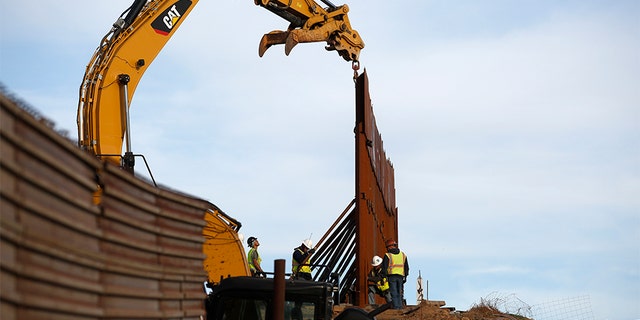There was a telling moment yesterday when President Trump was pushing back against still more media accounts he views as unfair.
Trump had walked out of a Capitol Hill meeting with Chuck Schumer and Nancy Pelosi, having become convinced that they wouldn't budge on the government shutdown that is now headed toward its fourth week. The Senate minority leader said Trump had slammed the table, and House speaker had publicly called him "a petulant president of the United States." So this wasn't some media concoction, it was on-the-record reporting.
"I didn't pound the table, I didn't raise my voice. That was a lie," Trump told reporters.
He added: "I don't have temper tantrums, I really don't. But it plays to a narrative, but it's a lie."
In saying the story plays to a narrative, the president was acknowledging that his public image is very different than the way he views himself — and, not shockingly, blaming the press. It's usually journalists who talk about narratives, but Trump, of course, is the media critic-in-chief.
In the long run, whether he pounded the table or not is irrelevant. Trump clearly made a hasty exit from the meeting, since by his own account he said "bye-bye" and walked out after Pelosi told him the Democrats wouldn't fund his border wall even if he reopened the government.
Every White House tries to sell a narrative to the public, and that often clashes with the media portrait. But not since the Nixon days has there been such a virulent and relentless battle over which picture is closer to the truth.
In that media availability, Trump said "the news incorrectly reported" the incident. He said he asked Pelosi if they spoke in 30 days, after a government reopening, "are you going to give us great border security, which includes a wall or a steel barrier," and she said no.
"What you should do is give them Pinocchios" — handed out by the Washington Post fact-checker — because Mike Pence and Kevin McCarthy back his account of the meeting, Trump said. But he said the press would stick with "what you guys reported anyway because you're fake news."
The president was on shakier ground when he scolded the press for reporting on something he's said dozens and dozens of times.
"I know the fake news likes to say it," Trump said, that "during the campaign I would say Mexico is going to pay for it. Obviously I never said this and I never meant they're going to write out a check. I said they're going to pay for it."
He flatly made that promise, leaving the impression that the Mexican government would somehow pick up the tab for the border wall. I always thought he would have some kind of accounting explanation if the wall got built. And Trump said the Mexicans are paying for the wall through the "incredible deal we made" on trade, which replaced NAFTA. Of course, the government remains in partial shutdown because of a fight over 5.7 billion American dollars.
The president also tweeted about the leak to The New York Times, which I reported on yesterday, that he'd said he didn't want to give the Oval Office speech but was talked into it by his communications team.
"Gave an OFF THE RECORD luncheon, somewhat of a White House tradition or custom, to network anchors yesterday - and they quickly leaked the contents of the meeting. Who would believe how bad it has gotten with the mainstream media, which has gone totally bonkers!"
Bonkers may be one of the few insults he hasn’t hurled at the media.
But someone in that room did betray him by violating the off-the-record ground rules.
And there was this:
"The Mainstream Media has NEVER been more dishonest than it is now. NBC and MSNBC are going Crazy. They report stories, purposely, the exact opposite of the facts. They are truly the Opposition Party working with the Dems. May even be worse than Fake News CNN, if that is possible!"
The president, as is his wont, conflates many things with his attacks and counterattacks on the press.
He fights back when he has a different version of a closed-door meeting, or when an off-the-record agreement is broken: fair enough. But he also accuses the media of dishonesty for reminding everyone of his campaign vow that "Mexico will pay for it." And he throws in insults — bonkers, crazy, opposition party — that aren't always tied to a specific complaint.
The president and the press remain wedded to their narratives, which all too often are diametrically opposed.
Trump had walked out of a Capitol Hill meeting with Chuck Schumer and Nancy Pelosi, having become convinced that they wouldn't budge on the government shutdown that is now headed toward its fourth week. The Senate minority leader said Trump had slammed the table, and House speaker had publicly called him "a petulant president of the United States." So this wasn't some media concoction, it was on-the-record reporting.
"I didn't pound the table, I didn't raise my voice. That was a lie," Trump told reporters.
He added: "I don't have temper tantrums, I really don't. But it plays to a narrative, but it's a lie."
In saying the story plays to a narrative, the president was acknowledging that his public image is very different than the way he views himself — and, not shockingly, blaming the press. It's usually journalists who talk about narratives, but Trump, of course, is the media critic-in-chief.
In the long run, whether he pounded the table or not is irrelevant. Trump clearly made a hasty exit from the meeting, since by his own account he said "bye-bye" and walked out after Pelosi told him the Democrats wouldn't fund his border wall even if he reopened the government.
Every White House tries to sell a narrative to the public, and that often clashes with the media portrait. But not since the Nixon days has there been such a virulent and relentless battle over which picture is closer to the truth.
In that media availability, Trump said "the news incorrectly reported" the incident. He said he asked Pelosi if they spoke in 30 days, after a government reopening, "are you going to give us great border security, which includes a wall or a steel barrier," and she said no.
"What you should do is give them Pinocchios" — handed out by the Washington Post fact-checker — because Mike Pence and Kevin McCarthy back his account of the meeting, Trump said. But he said the press would stick with "what you guys reported anyway because you're fake news."
The president was on shakier ground when he scolded the press for reporting on something he's said dozens and dozens of times.
"I know the fake news likes to say it," Trump said, that "during the campaign I would say Mexico is going to pay for it. Obviously I never said this and I never meant they're going to write out a check. I said they're going to pay for it."
He flatly made that promise, leaving the impression that the Mexican government would somehow pick up the tab for the border wall. I always thought he would have some kind of accounting explanation if the wall got built. And Trump said the Mexicans are paying for the wall through the "incredible deal we made" on trade, which replaced NAFTA. Of course, the government remains in partial shutdown because of a fight over 5.7 billion American dollars.
The president also tweeted about the leak to The New York Times, which I reported on yesterday, that he'd said he didn't want to give the Oval Office speech but was talked into it by his communications team.
"Gave an OFF THE RECORD luncheon, somewhat of a White House tradition or custom, to network anchors yesterday - and they quickly leaked the contents of the meeting. Who would believe how bad it has gotten with the mainstream media, which has gone totally bonkers!"
Bonkers may be one of the few insults he hasn’t hurled at the media.
But someone in that room did betray him by violating the off-the-record ground rules.
And there was this:
"The Mainstream Media has NEVER been more dishonest than it is now. NBC and MSNBC are going Crazy. They report stories, purposely, the exact opposite of the facts. They are truly the Opposition Party working with the Dems. May even be worse than Fake News CNN, if that is possible!"
The president, as is his wont, conflates many things with his attacks and counterattacks on the press.
He fights back when he has a different version of a closed-door meeting, or when an off-the-record agreement is broken: fair enough. But he also accuses the media of dishonesty for reminding everyone of his campaign vow that "Mexico will pay for it." And he throws in insults — bonkers, crazy, opposition party — that aren't always tied to a specific complaint.
The president and the press remain wedded to their narratives, which all too often are diametrically opposed.


























